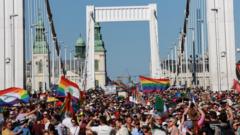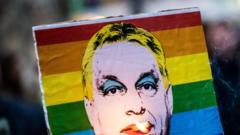In a bold act of defiance against government restrictions, Karacsony appeared at the National Bureau of Investigation, affirming his commitment to freedom and equality in Budapest.
Budapest Mayor Faces Police Inquiry Over Controversial Pride March

Budapest Mayor Faces Police Inquiry Over Controversial Pride March
The mayor of Budapest, Gergely Karacsony, is embroiled in a police investigation for alleged involvement in organizing a banned LGBTQ Pride march in the city.
In a surprising turn of events, Budapest's mayor, Gergely Karacsony, has found himself under police scrutiny as a suspect linked to the controversial organization of a banned LGBTQ Pride march that took place on June 28. Despite warnings from Hungary's Prime Minister Viktor Orban and a governmental ban on the rally due to newly enacted laws, an impressive turnout of around 200,000 individuals came together in defiance, transforming the event into a potent anti-government demonstration.
The mayor, who donned a rainbow T-shirt adorned with the capital's coat of arms, stated passionately to supporters outside the investigation venue, “Neither freedom nor love can be banned in Budapest.” Facing serious charges that could lead to a sentence of up to one year in prison for his alleged role in the event's organization, Karacsony emphasized the injustice of the accusations. “I consider this to be unfounded and I will lodge a complaint against it,” he declared, before presenting a statement to investigators without responding to their inquiries.
The Pride event had been previously jeopardized due to a law passed in March that limited gatherings under the guise of child protection, which has been perceived by many as targeted at the LGBTQ+ community. This reflects a broader governmental agenda, as Hungary has seen the repeal of legal recognition for transgender individuals and the introduction of restrictions on public depictions of homosexuality for minors.
In a show of solidarity, the mayor had previously reassured citizens that Budapest City Hall would facilitate the annual Pride event, claiming that local government entities could not be legally barred from organizing such gatherings. Surprisingly, Budapest police later declared that they would not penalize attendees, who could have faced fines of up to €500 for joining the parade. Meanwhile, the National Bureau of Investigation has initiated a probe into an "unknown perpetrator" accused of orchestrating the march, highlighting the ongoing tensions between local governance and national policies concerning LGBTQ+ rights.
The mayor, who donned a rainbow T-shirt adorned with the capital's coat of arms, stated passionately to supporters outside the investigation venue, “Neither freedom nor love can be banned in Budapest.” Facing serious charges that could lead to a sentence of up to one year in prison for his alleged role in the event's organization, Karacsony emphasized the injustice of the accusations. “I consider this to be unfounded and I will lodge a complaint against it,” he declared, before presenting a statement to investigators without responding to their inquiries.
The Pride event had been previously jeopardized due to a law passed in March that limited gatherings under the guise of child protection, which has been perceived by many as targeted at the LGBTQ+ community. This reflects a broader governmental agenda, as Hungary has seen the repeal of legal recognition for transgender individuals and the introduction of restrictions on public depictions of homosexuality for minors.
In a show of solidarity, the mayor had previously reassured citizens that Budapest City Hall would facilitate the annual Pride event, claiming that local government entities could not be legally barred from organizing such gatherings. Surprisingly, Budapest police later declared that they would not penalize attendees, who could have faced fines of up to €500 for joining the parade. Meanwhile, the National Bureau of Investigation has initiated a probe into an "unknown perpetrator" accused of orchestrating the march, highlighting the ongoing tensions between local governance and national policies concerning LGBTQ+ rights.




















